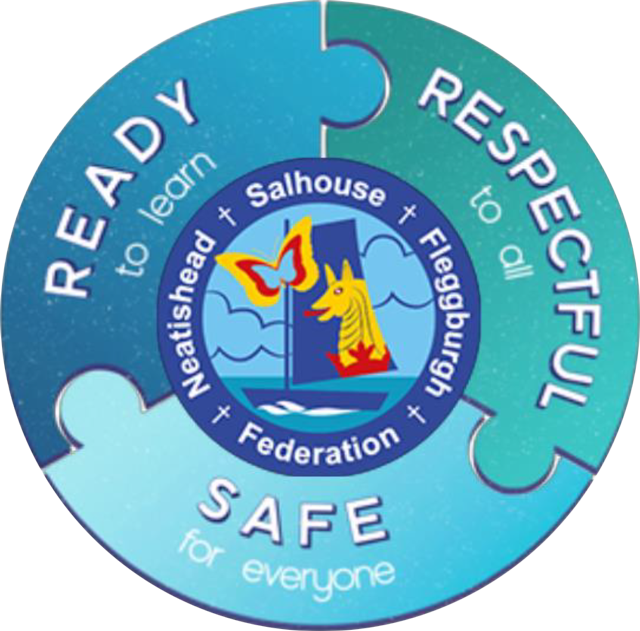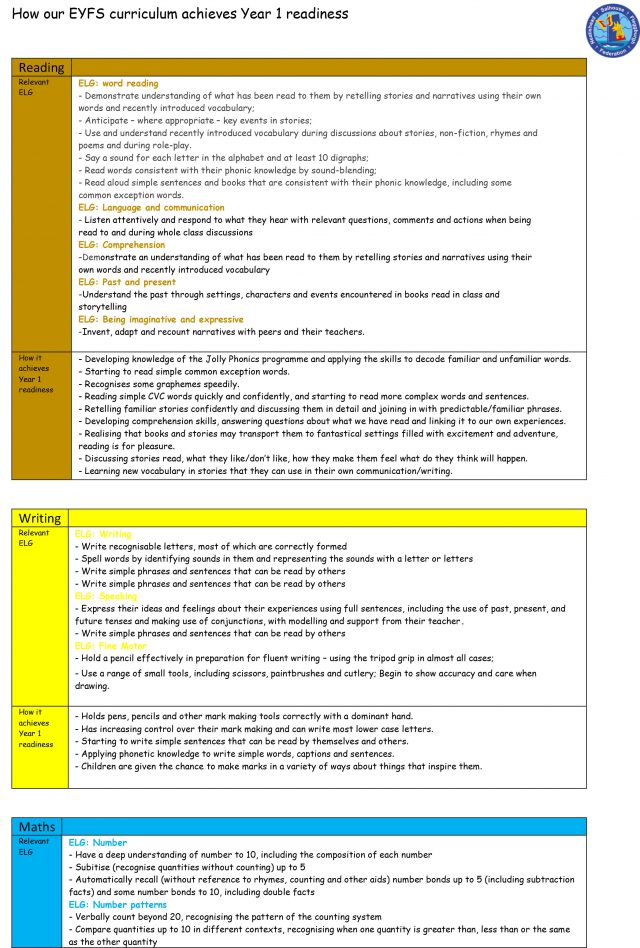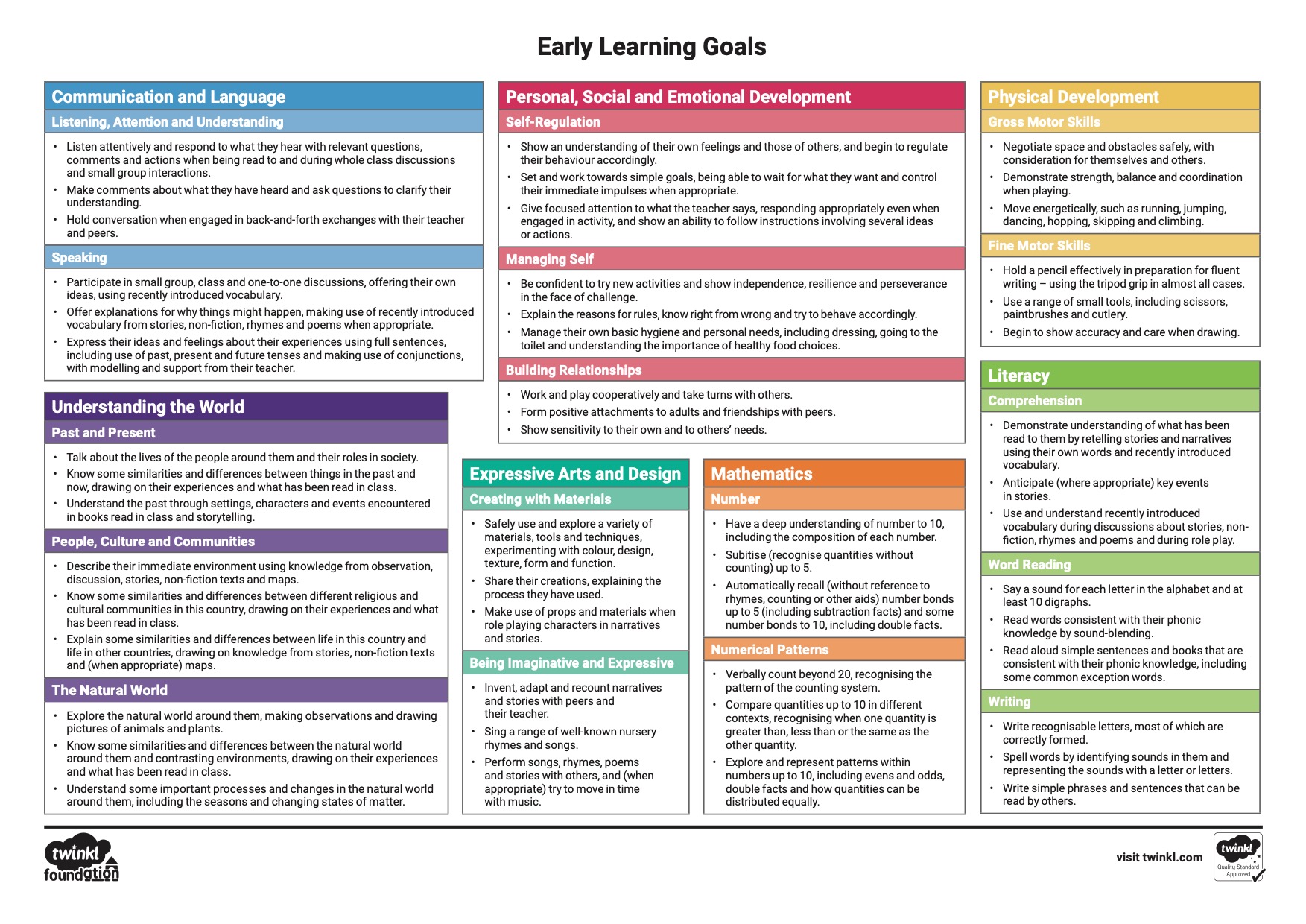Early Years Foundation Stage
The Early Years Foundation Stage is the period of education and development from birth to five.
| School | Pre school | |
| Neatishead | Mixed Reception, Year 1 and Year 2 class | Neatishead and Barton pre school nursery on site run by a separate committee |
| Salhouse | Mixed Reception and Year 1 class | Fledglings nursery on site and managed by the school |
| Fleggburgh | Mixed Reception, Year 1 and Year 2 class | Little Explorers Forest School nursery on site run by a separate committee |
Intent
Our curriculum is designed to recognise children’s prior learning from previous settings and their experiences at home. Every child is recognised as a unique individual and we celebrate and welcome differences and individual character. The ability to learn is underpinned by the teaching of basic skills, knowledge, concepts and values. We provide enrichment opportunities to engage learning and believe that children’s first experiences of school should be shared, happy, positive and full of awe and wonder enabling us to develop a lifelong love of learning. We want our children become confident, fluent readers who enjoy books and read for pleasure. Community involvement is an essential part of our curriculum within and beyond the school. Ensuring children have a smooth transition into school is a priority. Throughout their time in EYFS, the children develop a sense of belonging to our school community, ready for transition into year 1 and beyond. We aim for the children to have the confidence and skills to make decisions and self-evaluate, make connections and become lifelong learners. We work in partnership with parents and carers to encourage independent, happy learners who thrive in school and reach their full potential from their various starting points. We understand and follow children’s interests and provide opportunities throughout our EYFS curriculum to support learning, consolidate and deepen knowledge and ensure children meet their next steps. We create an indoor and outdoor environment which supports learning. We build strong relationships. We prepare children to achieve a Good Level of Development (GLD) and the Early Learning Goals at the end of the Foundation Stage and ensure children make at least good progress from their starting points. Our Christian core values underpin all we say and do, and we support children to soar on wings.
Implementation
We follow the Early Years Statutory Framework for the Early Years Foundation Stage. This framework specifies the requirement for learning and development in the Early Years and provides prime and specific areas of learning we cover in our curriculum. We have a curriculum that is child-centred and one which encourages active learning. Children’s interests and strengths inform planning. All areas of the EYFS curriculum are followed and planned for to ensure there is a broad, balanced and progressive learning environment and curriculum. The children will learn new skills, acquire new knowledge and demonstrate understanding through the seven areas of the EYFS curriculum: Personal, Social and Emotional Development, Physical Development, Communication and Language, Literacy, Mathematics, Understanding the World and Expressive Arts and Design. There is a considered balance of child initiated, adult supported and adult led activities in both the indoor and outdoor provision. Children have daily dedicated phonics’ sessions and reading books are carefully matched to phonics’ knowledge. Continuous Provision practice and principles support children to develop key life skills such as independence, innovation, creativity, enquiry, analysis and problem solving. During the school day, children will have an opportunity to work independently, work collaboratively with their friends and with adults. We ensure activities support the Characteristics of Effective Learning. Daily guided activities are also planned to cover different areas of the EYFS curriculum and allow children to develop their next steps in learning. Through formative assessment, observation and discussion, areas of need and next steps are identified and inform planning. In planning and guiding children’s activities, we reflect on the different ways that children learn and reflect these in our practice. We embed metacognitive teaching strategies. Staff in the EYFS make regular observations of the children’s learning to ensure their next steps are identified and met. These are collected in each child’s online learning journey and shared with parents. We include interventions for groups or individuals, as needed. We prioritise multi agency working to support children’s healthy development and welfare.
Impact
Children’s progress across the EYFS curriculum is at least good from their varied starting points. Children achieve a Good Level of Development and Early Learning Goals at the end of Reception in line with local and national expectations. Classrooms are purposeful and engaging environments which support teaching and learning. Relationships are strong, creating a nurturing ethos which supports teaching and learning. There is an enthusiasm for reading. Assessment of children’s Learning Journeys evidenced on Tapestry, in books and in their learning behaviours, support all areas of the EYFS curriculum. Teacher assessments are accurate and inform next steps and planning. Children enjoy positive transitions. Teachers and parents work together with the child’s needs at the centre of decisions so supporting teaching and learning. Special educational and pastoral needs are identified early and early intervention supports progress. Children have full access to the curriculum. Children become resilient learners who have early learning behaviours and values which enables them to soar on wings.
Members of staff are observing the children through play based activities both child and adult led in both Coots and Fledglings. The children's development is monitored using the Early Year Foundation Stage Framework which covers birth to the age of 5.
There are seven areas, these are:
Prime:
|
Specific:
|
When a child starts with us we create a learning journey to show their development and progression either using an online system called Tapestry. The aim is that when a child reaches the end of reception that they will have met the Early Learning Goals.
To achieve a 'Good Level of Development' (GLD) by the end of Year R children must reach the Early Learning Goals in all three prime areas and in Literacy and Mathematics.
Please go here to find out more information about the Early Years Foundation Stage.





